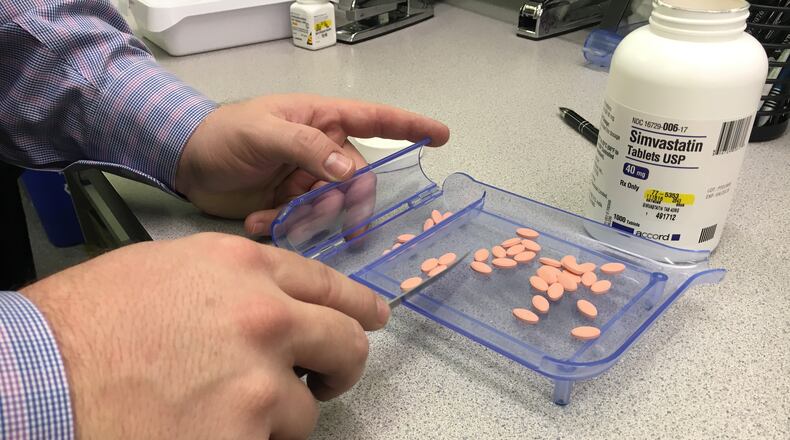The companies, called pharmacy benefit managers, negotiate deals on drugs and process pharmacy claims. They charge Medicaid plans for the cost of drugs and they pay pharmacists for the prescriptions.
But the critics say there isn’t enough transparency about how much of the taxpayer money that flows through these middlemen makes its way to pharmacists. For some drugs, pharmacists say they only get paid a small portion of the price billed to Medicaid plans and the rest is kept by the pharmacy benefit managers.
The state has said the companies saved Ohio Medicaid $145 million compared to the old system of directly paying fees for services.
Catching up? Read our latest pharmacy reporting here:
• Pharmacy middlemen made $223.7M from Ohio Medicaid
• With small pharmacies disappearing, Medicaid cuts seen as culprit
• DeWine anticipates ‘major litigation’ against pharmacy middlemen
But Ohio Medicaid announced Tuesday afternoon that the insurance companies will have to cancel their current contracts with pharmacy benefit managers and enter new vendor contracts using a different business model.
The new contracts will have to be in place by Jan. 1.
“Ohio Medicaid’s focus is to ensure that Medicaid enrollees have access to quality health care, including pharmacy benefits, and taxpayers get a fair price. Therefore, we are now taking aggressive action to ensure full transparency for the greater good of the public interest,” the department said in a statement.
CVS Caremark, which contracts with four of the five Medicaid plans in Ohio, said in a statement that the company “is aware of this new requirement from the Ohio Department of Medicaid and is working with our clients (the managed care plans) to update our contracts moving forward.”
Ohio Association of Health Plans, a trade group that represents the Medicaid plans, said the companies are “ready to implement the changes” by Jan. 1.
“We welcome the opportunity to continue to provide transparency with regard to drug costs, and welcome a robust review of all factors that go into the rise in drug costs, including manufacturers and distributors,” said Miranda Motter, CEO of the association.
The pharmacy middlemen that now work for Ohio Medicaid plans — CVS Caremark and OptumRx — managed $2.5 billion in 2017.
A report in June revealed CVS Caremark kept 8.7 percent of the payments it received, or $197.3 million. OptumRx kept 9.4 percent, or $26.4 million.
Until the June report came out, the state government and the public did not know how much of the money the companies were keeping. The companies also have additional ways of making money, including fees and rebates.
Still, according to the report, Medicaid saved $145 million under the privatized system compared to the former system where the Ohio directly paid fees for services.
Skyrocketing prescription drug prices are one of the drivers behind states spending growing portions of their budgets on Medicaid, which is jointly funded with state and federal dollars.
When Medicaid costs climb, it not only puts pressure on the low-income health insurance program but can also stress other state programs that are all vying for a limited amount of tax dollars.
When Ohio Medicaid handed management of Medicaid plans to private companies — and those companies handed management of pharmacy benefits to other private companies — the state was able to keep costs contained and predictable.
However, critics have said those controlled state costs have come at the expense of community pharmacies and transparency.
The Ohio Pharmacists Association has said that the pharmacy benefit managers keep too much of the money they manage and pay pharmacists too little for prescription drugs, pushing some to sell or go out of business.
MORE: Employed but uninsured? In Ohio, you’re not alone
In a letter to the insurance companies, Ohio Medicaid said under the new rules, pharmacy benefit managers will charge the insurance companies exactly what it pays the pharmacy for prescription drugs and dispensing fees.
Pharmacy benefit managers would charge an explicit fee for administrative services.
State Rep. Kyle Koehler, R-Springfield, welcomed the state announcement as moving toward more transparency on how tax dollars are spent on prescription drugs.
“We’re having trouble getting a handle on what we’re actually paying for prescription drugs. I think this move is going to allow us to move past this opaque pricing,” he said.
Koehler is one of the sponsors of H.B. 465, which would have carved out prescription drug costs and had the state directly pay fees for services. The bill had one hearing and Koehler said the role of the proposal may end up being to help drive the conversation and shed light on a problem that needed fixed.
State Rep. Thomas West, D-Canton, said “the fact that this has been allowed to continue for so long is an insult to the hardworking taxpayers of Ohio who are concerned about accessing affordable and lifesaving healthcare.”
The Ohio Auditor is planning to reveal a report on Thursday that will have more details about how much the pharmacy benefit managers have been keeping for different drug types and in different parts of the state.
“We shared a draft of our report with (Ohio Medicaid) yesterday. We had hoped our report would have a significant impact on state policy. We just didn’t expect it to happen this quickly,” the auditor’s office said in a statement.
Ohio Medicaid said in a statement the department appreciated being able to review the auditor’s report, but the plan to switch to a new payment model had been in the works before reviewing the auditor’s findings.
About the Author
